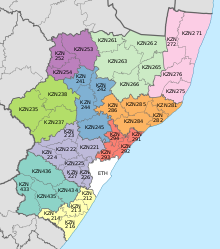Ubuhlebezwe Local Municipality
Ubuhlebezwe | |
|---|---|
 Location in KwaZulu-Natal | |
| Country | South Africa |
| Province | KwaZulu-Natal |
| District | Harry Gwala District |
| Seat | Ixopo |
| Wards | 12 |
| Government | |
| • Type | Municipal council |
| • Mayor | Noleen Joanne Peterson |
| Area | |
| • Total | 1,604 km2 (619 sq mi) |
| Population (2011)[2] | |
| • Total | 101,691 |
| • Density | 63/km2 (160/sq mi) |
| Racial makeup (2011) | |
| • Black African | 97.5% |
| • Coloured | 1.2% |
| • Indian/Asian | 0.4% |
| • White | 0.8% |
| First languages (2011) | |
| • Zulu | 91.6% |
| • English | 3.1% |
| • Xhosa | 1.6% |
| • Southern Ndebele | 1.3% |
| • Other | 2.4% |
| Time zone | UTC+2 (SAST) |
| Municipal code | KZN434 |
Ubuhlebezwe Local Municipality is an administrative area in the Harry Gwala District of KwaZulu-Natal in South Africa. Ubuhlebezwe is an isiZulu name meaning "The Beauty of the Land". The name is derived from Alan Paton's novel, Cry, The Beloved Country.[4]
Main places
The 2001 census divided the municipality into the following main places:[5]
| Place | Code | Area (km2) | Population |
|---|---|---|---|
| Amakhuze | 55101 | 40.53 | 4,726 |
| Dlamini/Vusathina Mazulu | 55102 | 19.13 | 3,532 |
| Dunge | 55103 | 47.70 | 2,666 |
| Ikhwezi/Lokusa | 55104 | 48.56 | 12,316 |
| Ixopo | 55105 | 6.24 | 8,434 |
| Izimpethu Endlovu | 55106 | 10.23 | 751 |
| Mjoli/Mawushe(Sizwe Hlanganani) | 55107 | 72.47 | 12,580 |
| Nyuswa | 55108 | 33.78 | 4,063 |
| Shiyabanye/Nhlangwini | 55109 | 85.96 | 11,476 |
| Ukuthula | 55111 | 20.04 | 10,208 |
| Vukani | 55112 | 55.92 | 9,804 |
| Vumakwenza/Sangcwaba | 55113 | 94.13 | 4,524 |
| Remainder of the municipality | 55110 | 1,091.78 | 16,873 |
Politics
The municipal council consists of twenty-seven members elected by mixed-member proportional representation. Fourteen councillors are elected by first-past-the-post voting in fourteen wards, while the remaining thirteen are chosen from party lists so that the total number of party representatives is proportional to the number of votes received. In the election of 3 August 2016 the African National Congress (ANC) won a majority of twenty seats on the council. The following table shows the results of the election.[6][7]
style="width: 2px; color:inherit; background-color: #006600;" data-sort-value="African National Congress" | style="width: 2px; color:inherit; background-color: #852A2A;" data-sort-value="Economic Freedom Fighters" | style="width: 2px; color:inherit; background-color: #FF0000;" data-sort-value="Inkatha Freedom Party" | style="width: 2px; color:inherit; background-color: #DCDCDC;" data-sort-value="Independent (politics)" | style="width: 2px; color:inherit; background-color: #005BA6;" data-sort-value="Democratic Alliance (South Africa)" || Party | Votes | Seats | ||||||
|---|---|---|---|---|---|---|---|---|
| Ward | List | Total | % | Ward | List | Total | ||
| ANC | 25,842 | 28,296 | 54,138 | 76.0 | 12 | 8 | 20 | |
| EFF | 2,983 | 3,084 | 6,067 | 8.5 | 0 | 2 | 2 | |
| IFP | 2,778 | 2,846 | 5,624 | 7.9 | 0 | 2 | 2 | |
| Independent | 3,070 | – | 3,070 | 4.3 | 2 | – | 2 | |
| DA | 1,099 | 1,213 | 2,312 | 3.3 | 0 | 1 | 1 | |
| Total | 35,772 | 35,439 | 71,211 | 100.0 | 14 | 13 | 27 | |
| Spoilt votes | 997 | 1,199 | 2,196 | |||||
References
- ^ "Contact list: Executive Mayors". Government Communication & Information System. Archived from the original on 14 July 2010. Retrieved 22 February 2012.
- ^ a b "Statistics by place". Statistics South Africa. Retrieved 27 September 2015.
- ^ "Statistics by place". Statistics South Africa. Retrieved 27 September 2015.
- ^ South African Languages - Place names
- ^ Lookup Tables - Statistics South Africa
- ^ "Results Summary – All Ballots: Ubuhlebezwe" (PDF). Independent Electoral Commission. Retrieved 12 January 2017.
- ^ "Seat Calculation Detail: Ubuhlebezwe" (PDF). Independent Electoral Commission. Retrieved 12 January 2017.


